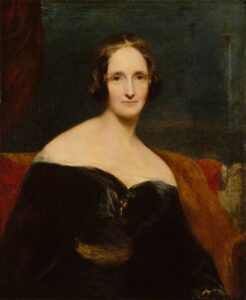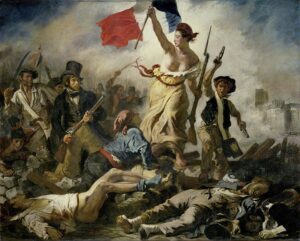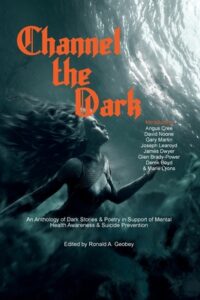
Rothwell, Richard; Mary Wollstonecraft Shelley; National Portrait Gallery, London; http://www.artuk.org/artworks/mary-wollstonecraft-shelley-157761
Mary Shelley, or Mary Wollstonecraft Shelley, aka Mary Wollstonecraft Godwin, will forever be among the stars in my library simply through the writing of Frankenstein, one of the first science fiction novels and the themes of which I’m going to explore a bit here.
Bear in mind that she was 19 when she began writing it, and that it was published in 1818 when she was 21. While she is certainly respected, I, like this Guardian writer a few years ago, don’t feel she gets the level of respect she deserves. While responses were generally positive, one editor in the 1880s wrote in the preface – the preface! – that the book represents “the first of a class of fiction – not of a very high order” that was also explored by Poe (who, like Mary Shelley, used electricity and the galvanic battery as a plot device).
What had I accomplished by the age of 19? Certainly not pioneering a genre, although she wrote other novels and works which are also very good but which I’ve only come to recently, most notably the novella Matilda which her father, the perpetually in debt political radical William Godwin, refused to publish in his lifetime because it deals with incestuous love of a father for his daughter. She also wrote a post-apocalyptic novel called The Last Man where humanity has been wiped out by a virus, but I haven’t been able to get a copy of that yet.
There are several editions of Frankenstein, with the 1818 one closer to her original vision and the 1831 one influenced by the death of Percy Shelley and of her own children. I have both, but anything referenced here comes from the 1818 version which I have as a Norton Critical Edition.
I’m going to assume you know the general plotline, but here it is in summary all the same: Man learns science, creates monster, monster exacts extensive revenge, nobody survives. That’s a grossly simplified summary, true, but “and then they all died” seems to be a common enough solution to 18th and 19th-century novels.
The creature, referred to in the text as a daemon, is really an extended metaphor for the thin line between civility and brutality, and most importantly what can happen when the marginalised and powerless are oppressed savagely and given no chance for justice.
This theme of power and oppression, of gentry and those without property or means, is a major theme in the works of her father and mother. Godwin’s Caleb Williams, for example, is a novel that explores the crushing use of power and prison in a rigidly class-based society. Mary Shelley’s mother, Mary Wollstonecraft, drew on her own life in two novellas that pick up on the general theme, Mary and Maria: The Wrongs of Woman, with the latter (and Godwin himself) influenced by how power can become misused by those who previously didn’t have it. Both were writing in the aftermath of the French Revolution, which Wollstonecraft had seen.

Frankenstein is an allegory of what happens when a cruel, harsh world tramples on innocence of the Other – much as Victor makes the creature physically, the world makes him morally (initially he thinks that just be engaging in conversation he can overcome any revulsion). Unable to make a real connection with humans, and seeing his creator experience some real happiness and family life having spurned him, the creature kills Victor’s baby brother, and having had his pleas for a mate ultimately rejected he kills Victor’s best friend and later his new bride. He tells Victor that he often experienced regret at what he had done, but he was given no kindness or affection that might have tempered his rage, or what he calls “eternal hatred and vengeance to all mankind”.
“You are my creator but I am your monster.” There is a parallel here with Lucifer in Paradise Lost, a parallel the creature acknowledges himself several times: “Many times I considered Satan the fitter emblem of my condition; for often, like him, when I viewed the bliss of my protectors [a family living in a house he was hiding next to], the bitter gall of envy rose within me.”
And yet the creature, Victor tells us, was designed to be beautiful. His skin barely contains his muscles, and he has long, lustrous hair that would not be out of place in a gentleman of the time. This is typically lost in any adaptation of the text as a film or otherwise, where the creature is generally made an obvious monster.
Victor, so engrossed in assembling and bringing life to his creation, only recoils from it once it comes to life (in a deliberately vague process because this narrative is told from Victor’s perspective and he doesn’t want people to follow his research). His reaction is so overblown and visceral that it’s an early example of what we would now call the Uncanny Valley, which is the theory that the closer something non-human gets to looking human the greater our instinctive hatred/disgust/fear (delete as applicable).
The reaction is not limited to Victor. Every time the creature encounters humans on his travels (he considers humans a different species to himself) he gets the same reaction: Fear, horror, violence, even being shot after rescuing a child from drowning. The creature frequently criticises the actions of humanity. He refers to the “barbarity” of mankind, and the “barbarous” nature of the villagers who expel him with violence.
The visible difference between the creature and humans is emphasised later in the text when his skin is described as being like that of a mummy, but it’s also described as yellow, so despite Victor’s best efforts he obviously stands out compared to the other inhabitants of Switzerland and Germany, even without factoring in his great height.

Unless told otherwise, I’d like to think of the creature as looking like a buff, hairy version of this
“I ought to be thy Adam, but I am rather the fallen angel [Lucifer], whom thou drivest from joy for no misdeed,” the creature tells Victor.
And later, he says: “Everywhere I see bliss, from which I am irrevocably excluded. I was benevolent and good; misery made me a fiend.” He shows some instinctive understanding of human emotions, such as when he realises that taking food from a homestead is harming its inhabitants (he does not understand speech at this stage).
The creature here is a commentary on human nature and the affect of external factors on one’s attitude and behaviour. He says he is “not even of the same nature as man”, and “Was I then a monster, a blot upon the earth from which all men fled, and whom all men disowned?”
The creature’s language about himself is full of pathos but is designed to heighten the sense of him as an Other, outside human society. He describes himself as deformed, as wretched, as loathsome. “Why did you form a monster so hideous that even you turned from me in disgust?” he asks his creator. Ultimately Victor starts describing himself in similar terms: “I, a miserable wretch, haunted by a curse that shut up every avenue to enjoyment”.
Fun fact: While it’s often said that Frankenstein is the creator and not the creature, the creature refers to Victor as “my father” which technically makes him a Frankenstein as well.
There is a naivete about the creature which Victor eventually realises. Having murdered several members of Victor’s family, the creature demands he be made a female counterpart, saying they will disappear into the rainforest and live together without harming anybody else. It does not occur to him, though it does to Victor, that the female counterpart may want nothing to do with him, although Victor goes off on a wild fear tangent of wondering if “she might become ten thousand times more malignant than her mate” and the two of them give rise to “a race of devils” opposed to mankind.
Overall the book is a brilliant example of not really science gone amok but the cautionary moral of “just because we can do a thing does not mean that we should do a thing”. While the idea of monsters and mad scientists is what cemented it in the popular imagination, the book itself deals with much bigger themes concerning power, class, and the outcomes of oppression. Quite the feat for a teenager.






